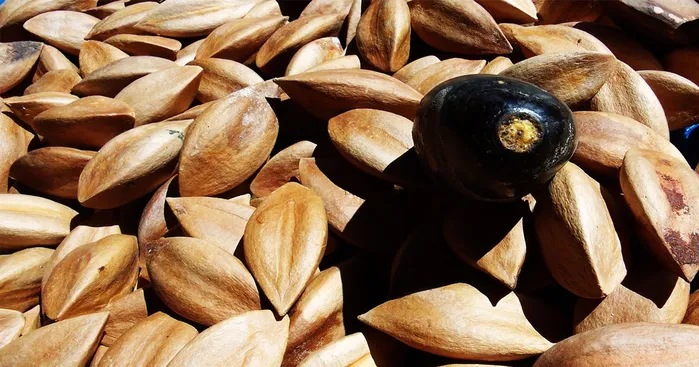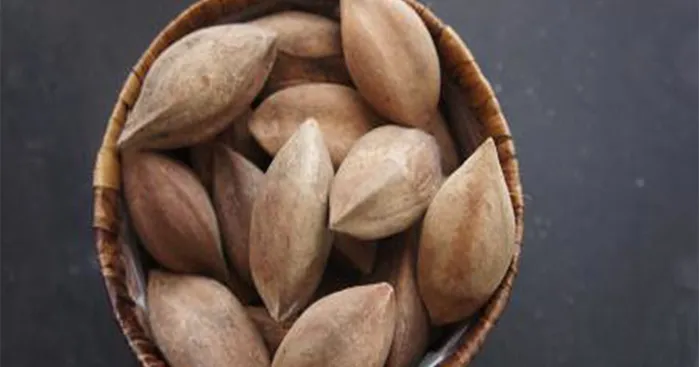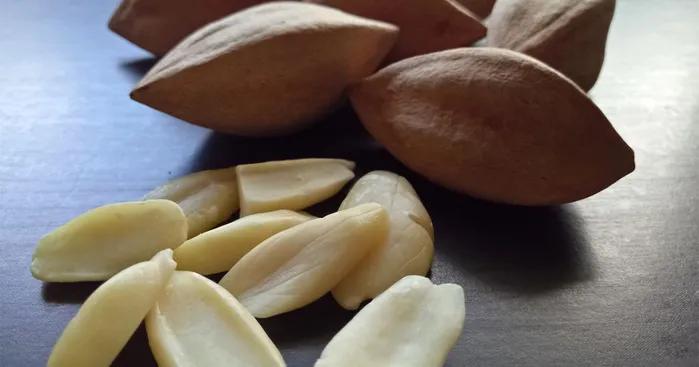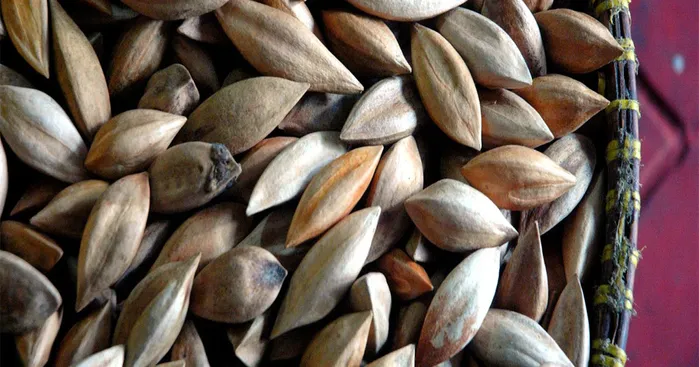Table of Contents

Pili nuts are a delicious and nutritious nut native to the Philippines.
They are a good source of protein, fiber, and healthy fats.
Pili nuts have also been shown to have several health benefits, including improved heart health, reduced cholesterol levels, and boosted cognitive function.
If you are looking for a healthy and delicious snack, pili nuts are a great option.
They can be eaten raw, roasted, or added to a variety of dishes.
Pili nuts are also a good source of protein, so they can be a helpful addition to a vegan or vegetarian diet.
In this blog post, we will explore the health benefits of pili nuts in more detail.
We will also discuss how to add pili nuts to your diet and where to find them.
Pili nuts overview:

Pili nuts are the edible seeds of the Canarium ovatum tree, which is native to the Philippines.
It is also native to Southeast Asia, Northern Australia, and Papua New Guinea.
The nuts are teardrop-shaped and range in size from 1-3 inches long and 0.5-1.5 inches wide.
The tree can grow up to 20-25 meters tall.
Pili nuts are typically eaten raw or roasted, and they can be marketed with or without the shell.
The edible part of the nut is the kernel.
The raw flavor of pili nuts is similar to pumpkin seeds, and when roasted, they acquire a nutty flavor reminiscent of pine nuts and macadamia nuts.
Pili nuts are a hardy crop and can remain edible for long periods, making them an important source of nutrients in this part of the world.
They are also popular snack food and can be used in a variety of dishes, such as salads, desserts, and baked goods.
Pili nuts are only produced from plants of the Laysa, Magnaye, M. Orolfo, Lanuza, and Magayon varieties of Canarium ovatum Engl.
Pili nuts are a good source of protein, fat, and fiber, vitamins E, thiamin, and manganese.
Pili nuts are a popular ingredient in Filipino cuisine, and they are often used in salads, desserts, and snacks.
They are also a sustainable crop, as they can be grown without the use of pesticides or herbicides.
Pili nuts nutritional values and health benefits:

Nutritional values:
Pili nuts are a nutritional powerhouse.
They are high in fat, protein, and magnesium, and they also contain copper and manganese.
A single serving of pili nuts can meet your daily requirements for these nutrients.
Pili nuts are a complete protein, which means they contain all nine essential amino acids.
This makes them a good choice for people who are looking for a plant-based source of protein.
Pili nuts are also a good source of healthy fats.
They contain mostly monounsaturated and polyunsaturated fats, which are beneficial for heart health.
However, pili nuts are also high in calories.
A single cup of pili nuts contains over 650 calories. So, it’s important to eat pili nuts in moderation.
Overall, pili nuts are a healthy and nutritious food.
They are a good source of protein, healthy fats, and essential minerals.
However, it’s important to eat them in moderation due to their high-calorie content.
Health benefits:

Chronic illness
In addition to reducing inflammation, the antioxidants in pili nuts can also help to protect cells from damage.
This can help to prevent chronic diseases such as cancer.
A study published in the journal “Cancer Prevention Research” found that people who ate pili nuts had a lower risk of developing prostate cancer.
The study participants who ate the most pili nuts had a 40% lower risk of developing prostate cancer than those who ate the least.
Digestive Health
Pili nuts are a good source of fiber, which can help to keep your digestive system healthy.
Fiber is essential for good digestion, as it helps to regulate bowel movements and prevent constipation.
Pili nuts contain about 2 grams of fiber per ounce, which is about 8% of the daily recommended intake.
In addition to fiber, pili nuts also contain several other nutrients that are important for digestive health, including magnesium, phosphorus, and zinc.
Magnesium is a mineral that helps to relax the muscles in the digestive tract, which can help to reduce constipation.
Phosphorus is a mineral that helps to break down food, and zinc is a mineral that helps to heal the lining of the gut.
Energy
Pili nuts are a good source of protein, carbohydrates, and healthy fats.
These nutrients provide the body with energy, helping to keep you feeling full and energized throughout the day.
Protein is essential for building and repairing muscle tissue.
Carbohydrates are the body’s main source of energy, and they help to keep blood sugar levels stable.
Healthy fats provide the body with long-lasting energy and help to keep the body feeling full.
Development and growth
Protein is essential for growth and development.
Pili nuts are a good source of protein, so they can help to support the growth and development of children and adolescents.
Protein is also important for adults, as it helps to maintain muscle mass and strength.
Pili nuts can be a good addition to the diet of anyone who is looking to improve their overall health and well-being.
Inflammation
Pili nuts are a good source of antioxidants, which can help to reduce inflammation in the body.
Inflammation is a natural response to injury or infection, but it can also be a chronic problem that contributes to several diseases, including heart disease, stroke, and cancer.
The antioxidants in pili nuts help to protect cells from damage, which can help to reduce inflammation.
They also help to remove free radicals from the body, which are unstable molecules that can damage cells.
Cholesterol balance
Pili nuts contain omega-3 fatty acids, which can help to balance cholesterol levels. Cholesterol is a type of fat that is found in the blood.
There are two types of cholesterol: LDL cholesterol, which is known as “bad” cholesterol, and HDL cholesterol, which is known as “good” cholesterol.
Omega-3 fatty acids help to raise HDL cholesterol and lower LDL cholesterol.
This can help to reduce your risk of heart disease and stroke.
A study published in the journal “Nutrition and Metabolism” found that people who ate pili nuts had a lower risk of developing heart disease.
The study participants who ate the most pili nuts had a 30% lower risk of developing heart disease than those who ate the least.
Diabetes
Pili nuts contain eight amino acids, which can help to regulate blood sugar levels.
This can be beneficial for people with diabetes or those who are at risk of developing the disease.
Amino acids are the building blocks of protein. When you eat protein, your body breaks it down into amino acids.
These amino acids are then used to build and repair muscle tissue, as well as to produce energy.
Insulin is a hormone that helps to regulate blood sugar levels.
When you eat carbohydrates, your body breaks them down into glucose, which is a type of sugar.
Glucose is then used for energy or stored in the liver and muscles.
Insulin helps to move glucose from the bloodstream into the cells, where it can be used for energy.
If you have diabetes, your body doesn’t produce enough insulin or doesn’t use insulin effectively.
This can cause blood sugar levels to rise too high.
The amino acids in pili nuts can help to regulate blood sugar levels by helping your body to use insulin more effectively.
This can help to prevent spikes in blood sugar levels, which can be beneficial for people with diabetes.
Weight loss
Pili nuts are a good source of protein and fiber, which can help you to feel full and satisfied.
This can help you to eat less and lose weight.
Protein is a nutrient that helps to build and repair muscle tissue.
Fiber is a nutrient that helps to regulate bowel movements and prevent constipation.
Both protein and fiber can help you to feel full, which can help you to eat less and lose weight.
A study published in the journal “Appetite” found that people who ate pili nuts as a snack had a lower calorie intake for the rest of the day than those who ate a high-sugar snack.
The study participants who ate pili nuts also had a lower body mass index (BMI) than those who ate the high-sugar snack.
Immune system
Pili nuts are a good source of antioxidants, which can help to protect the body against damage from free radicals.
Free radicals are unstable molecules that can damage cells and DNA.
Antioxidants can help to neutralize free radicals, reducing the risk of chronic diseases such as heart disease, cancer, and Alzheimer’s disease.
One of the most important antioxidants found in pili nuts is vitamin E.
Vitamin E is a fat-soluble vitamin that is essential for good health.
It has been shown to boost the immune system and help to protect against infection.
Pili nuts also contain other antioxidants, such as beta-carotene, lutein, and zeaxanthin.
These antioxidants can help to protect the body against damage from free radicals, and they may also play a role in reducing the risk of cancer.
Sleep
Magnesium is an important mineral for sleep.
It helps to regulate the production of melatonin, a hormone that helps to promote sleep.
Pili nuts are a good source of magnesium, so they can help to improve sleep quality.
Magnesium also helps to relax the body and mind, which can make it easier to fall asleep.
Additionally, magnesium can help to reduce anxiety and stress, which can also interfere with sleep.
Bone health
Pili nuts are a good source of minerals that are essential for strong bones, including calcium, zinc, copper, magnesium, manganese, and phosphorus.
These minerals help to maintain bone mineral density, which can decline as we age.
For example, calcium is the most abundant mineral in the body, and it is essential for building and maintaining strong bones.
Zinc is also important for bone health, as it helps to regulate the production of collagen, a protein that gives bones strength and flexibility.
Copper is another important mineral for bone health, as it helps to absorb iron, which is also essential for bone strength.
In addition to these minerals, pili nuts are also a good source of vitamin K, which is another important nutrient for bone health.
Vitamin K helps to activate proteins that are involved in bone formation.
